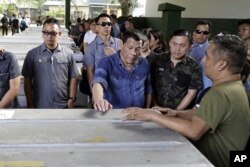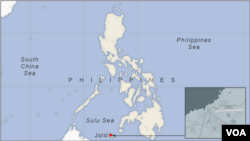Perpetrators of deadly church bombings in the Philippines Sunday are believed to be protesting a new Muslim autonomous region that so far excludes leaders in an outlying island group near the blast site.
Two bomb blasts killed 20 people and injured 111 Sunday at a church in Jolo, the major city in Sulu province. The local Islamic State-backed Muslim rebel group, Abu Sayyaf, took credit for the bombings, which came six days after voters in Sulu bucked a trend in much of the Philippine south: They voted against a law that will create the country’s strongest Muslim autonomous region.
“There was a strong no vote but it doesn’t affect the results,” said Ramon Casiple, executive director with the Philippine advocacy organization Institute for Political and Electoral Reform in Metro Manila.
The region, estimated at 4.3 million people, is to receive state funding and local control of resources, but its leaders are emerging so far just from the single Muslim rebel group that signed a 2014 peace deal with the government. Abu Sayyaf, which is connected to the dominant clan in Sulu and is best known for kidnapping foreign tourists, has been left out.
“The local dominant clan there had been strongly against incorporation of Sulu in the new region,” Casiple said. “It’s a question of political survival.”
The bomb blasts and underlying power struggle extend more than 50 years of Muslim rebel violence on the southern Philippine island Mindanao and adjacent Sulu Sea. About 121,000 have died, and the terrorist group Islamic State has backed Abu Sayyaf since 2016.
Disenfranchised rebels
Philippine President Rodrigo Duterte, a proponent of the Muslim autonomous region, ordered troops Monday to “crush” Abu Sayyaf and “vowed to give justice” to the families of bombing victims, the presidential office website says.
One bomb exploded near or inside a cathedral in Jolo, capital of Sulu province, and the second outside the compound, domestic media reports say.
Troops have weakened Abu Sayyaf since Duterte came to power in 2016, but their remnants often form new cells. Islamic State had picked a now deceased Abu Sayyaf leader as its Southeast Asian emir in 2016, the U.S.-based SITE Intelligence Group says.
Anger among the Abu Sayyaf remnants could portend more terrorist acts, said Eduardo Araral, associate professor at the National University of Singapore’s public policy school.
“If it spills over to Davao, Cagayan de Oro, Cebu and others, then maybe there’s some ISIS-Abu Sayyaf element to this, because they have the capability and the motivation to do that,” Araral said, referring to three major southern cities. If any future attacks stay in Jolo, he said, the violence might point to in-fighting among local tribes rather than a broader issue.
Power struggle in the autonomous region
While Sulu voters rejected formation of the Bangsamoro Autonomous Region of Muslim Mindanao, citizens in two cities and three other regions agreed to it. The Moro Islamic Liberation Front, a rebel group unconnected to Abu Sayyaf, is expected to lead in governing the region. Duterte signed in July the law authorizing the region’s formation over roughly 12,536 square kilometers.
Another rebel front active in Sulu also opposes the autonomous region, but the central government is negotiating with its top leader, Casiple said.
Government officials and Muslims outside Sulu hope the autonomous region will offer some of the self-rule that Muslims have sought for about 500 years in the majority Catholic country. That outcome could in turn ease fighting and let the population develop economically.
Conflicting goals among rebels
About 20 Muslim rebel groups still operate in Mindanao. One splintered off from the Moro Islamic Liberation Front and has attacked military holdings in Mindanao in the past two years. Groups excluded from Bangsamoro regional leadership might turn to Islamic State, scholars have warned.
Some people in Mindanao call Abu Sayyaf bandits with no political cause, but the group officially advocates creating an “independent Islamic state in Mindanao including the Sulu archipelago,” according to Australian National Security.
Abu Sayyaf may have plotted the Sunday bombings as a “demonstration” if they feel the Bangsamoro region falls short of its Muslim independence goal, said Enrico Cau, associate researcher at the Taiwan Center for International Strategic Studies.
Philippine officials should talk with the group and cut off its flow of money or weapons that reach Sulu easily because of its maritime location close to other countries, he said.
“Unless you stabilize the large swathe of ocean, there’s no way you can stop attacks from going on, because they keep moving troops and weapons and money and whatever else,” Cau said. Without that stability, he said, “Sulu will still be a weak point for the Philippines.”










